|
|
 |
Fiche d'espèce de Copépode |
|
|
Calanoida ( Ordre ) |
|
|
|
Calanoidea ( Superfamille ) |
|
|
|
Calanidae ( Famille ) |
|
|
|
Mesocalanus ( Genre ) |
|
|
| |
Mesocalanus lighti (Bowman, 1955) (F,M) | |
| | | | | | | Syn.: | Calanus lighti Bowman, 1955 (p.414, figs.F,M); Fleminger, 1967 a (tabl.1); Brodsky, 1972 (1975) (p.9, 69, 121); Mullin, 1969 (p.438, biogéo); Omori, 1969 (p.5, Table 1); Vyshkvartzeva, 1976 (p.14); 1977 a (p.97, figs.); Ambler & Miller, 1987 (tab.2, 3, 4, 5); Othman & al;, 1990 (p.565, Rem.)
Neocalanus lighti : Brodsky, 1983 & al., (p.189, figs.F,M); Pinchuk & Paul, 2000 (p.4, table 1, % occurrence) | | | | Ref.: | | | Bradford & Jillett, 1974 (p.6); Fleminger, 1985 (p.276, 285, Table 4, Rem.: A1); Bradford, 1988 (p.74, 76); Chihara & Murano, 1997 (p.741, Pl.69: F,M); Fornshell & Ferrari, 2014 (p.109, fig.6: Von Vaupel Klein's organ). | 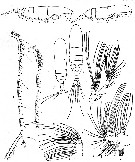 issued from : T.E. Bowman in Pacif. Sci., 1955, 9 (4). [p.415, Fig.1, a-b; e-k]. As Calanus lighti. Female (off Baja California): a, habitus (lateral right side); e, idem (dorsal); g, A1; i, A2; j, Mx1; k, Mx2. Nota: Ratio of length to depth of cephalothorax about 6:1 (as opposed to 4.5:1 in M. tenuicornisMale: b, habitus (lateral right side); f, idem (dorsal); h, A1
|
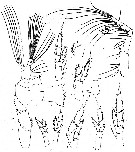 issued from : T.E. Bowman in Pacif. Sci., 1955, 9 (4). [p.417, Fig.2]. Female: a, Md; b, Md (masticatory edge); d, Mxp; e, P1; f, 1st segment of exopod of P1 (lateral view); g, 1st segment of endopod of P1); h, P2; i, P3; j, P4 ( basipod 1 not shown). Male: c, Md (gnathal lobe); l, P5; m, exopod of left P5. Nota: Mouth parts reduced, some of setae reduced in size or absent; ganthal lobe of Md much smaller and more weakly chitinized than in female.
|
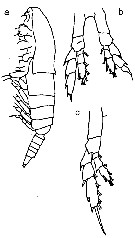 Issued from : M. Chihara & M. Murano in An Illustrated Guide to Marine Plankton in Japan, 1997. [p.748, Pl. 69, fig.89 a-c]. Female: c, P5. Male: a, habitus (lateral); b, P5.
|
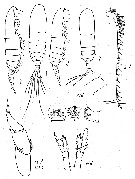 ssued from : K.A. Brodsky, N.V. Vyshkvartzeva, M.S. Kos & E.L. Markhaseva in Opred. Faune SSSR, 1983, 135. [p.189, Fig.83]. As Neocalanus lighti. Female and Male (after Bowman, 1955; Brodsky, 1972).
|
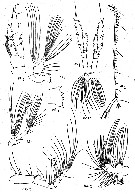 ssued from : K.A. Brodsky, N.V. Vyshkvartzeva, M.S. Kos & E.L. Markhaseva in Opred. Faune SSSR, 1983, 135. [p.188, Fig.82]. As Neocalanus lighti. Female (after Bowman, 1955; Brodsky, 1972).
|
 Issued from : J.A. Fornshell & F.D. Ferrari in Crustaceana, 2014, 87 (1). [p.109, Fig.1, A-C]. Von Vaupel Klein's organ on right endopodal segment 1 and right basal seta of P1. A, anterior, distal up; B, right basal seta; C, proximal endopodal segment (showing denticles, spines and pores) Scale line; short = 25 µm; long = 95 µm. The Von Vaupel Klein organ is an association (srtucture) of the distal seta from basis and the proximal endopodal segment of P1. This structure shows significant variability among many gymnoplean copepods, in the shape of the distodorsal corner of the proximal endopodal segment, presence and location of denticles on the anterior face of the segment, presence and size of denticles along the distal margin of the segment , number of pores on the segment, shape of the seta that originates on the basis, and the morphology of the basis at the origin of the seta. The function of this complex structure is not known.
| | | | | Ref. compl.: | | | Almeida Prado Por, 1985 (p.250); Suarez-Morales & Gasca, 1998 a (p108); Rebstock, 2001 (tab.2); 2002 (p.71, Table 3, 4, climatic variability); Mackas & al., 2006 (L22S07, Table 2); Williamson & McGowan, 2010 (p.273, Table 3, Pacific central gyres: N and S); in CalCOFI regional list (MDO, Nov. 2013; M. Ohman, comm. pers.); Hirai & al., 2013 (p.1, Table I, molecular marker) | | | | NZ: | 7 | | |
|
Carte de distribution de Mesocalanus lighti par zones géographiques
|
| | | | | | | Loc: | | | Red Sea (G. of Aqaba) (in Prado-Por, 1985; 1990), Pacif. (N & S), Okhotsk Sea (centtral), off NE Hawaii, California, off Japan (in Furuhashi, 1965), China Seas (East China Sea: 24°56'N, 127°59'E), Australia (G. of Carpentaria in Markina, 1972b), Pacific (central: N and S gyres) | | | | N: | 15 | | | | Lg.: | | | (131) F: 3,08-2,32; M: 2,27-1,98; (330) F: 3,08-2,32; M: 2,68-1,9; (866) F: 2,1-2,4; M: 1,9-2; {F: 2,10-3,08; M: 1,90-2,68} | | | | Rem.: | For Bowman (1955, p.416) M. lighti is most readily distinguisehed from M. tenuicornis by the shape of the body in lateral view.. The males of the two species are less easily distinguished than the females. | | | Dernière mise à jour : 21/02/2019 | |
|
|
 Toute utilisation de ce site pour une publication sera mentionnée avec la référence suivante : Toute utilisation de ce site pour une publication sera mentionnée avec la référence suivante :
Razouls C., Desreumaux N., Kouwenberg J. et de Bovée F., 2005-2026. - Biodiversité des Copépodes planctoniques marins (morphologie, répartition géographique et données biologiques). Sorbonne Université, CNRS. Disponible sur http://copepodes.obs-banyuls.fr [Accédé le 30 janvier 2026] © copyright 2005-2026 Sorbonne Université, CNRS
|
|
 |
 |









